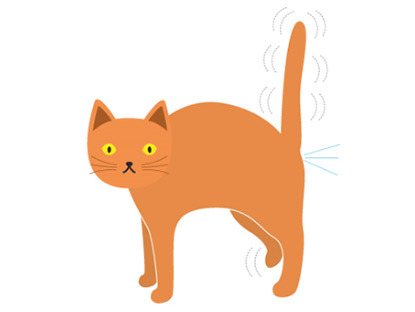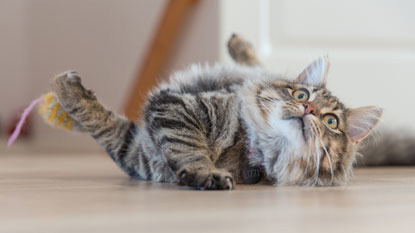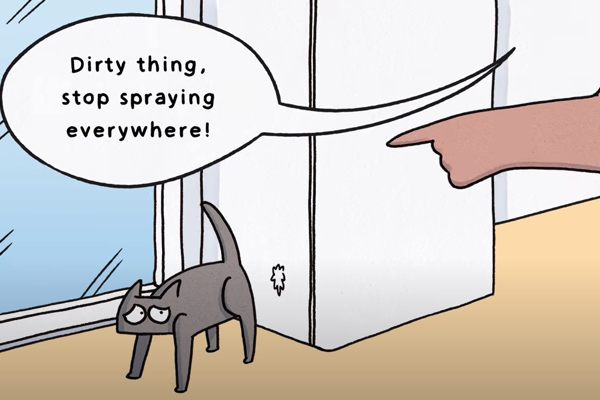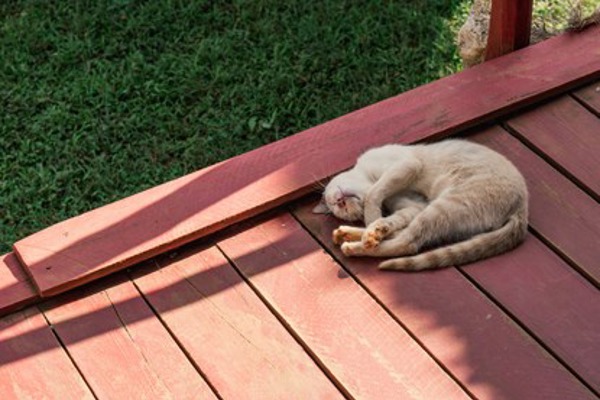Cat behaviourist Nicky helps one cat owner to identify which cat is spraying in the house, what to do if your cat is scared by the vacuum cleaner and why a cat may not like being stroked.
In our latest live Facebook FAQ event, Cats Protection’s Behaviour Manager Nicky Trevorrow took over our national Facebook page and answered behavioural questions from cat owners and supporters.
Don’t worry if you missed out, our feline specialists will return again soon. Have a look at the bottom of this post for upcoming dates to pop in your diary.
Here are some of the questions that Nicky answered:
One of my cats is spraying, how can we find out which one it is?
I have three sibling cats and have in the last three years taken on two strays, so now have a total of five cats. At first they seemed to get along ok but we now have a sprayer or sprayers. How do we find out which is the sprayer? We are at our wits’ end to know how to deal with this!
Sorry to hear that you've got cats spraying in the house. The first thing to do is to identify the sprayer/s. You can either set up a camera to spot who's doing it, or you can chat to your vet about getting some fluorescein to put in capsules. This will make the spray glow under UV light. It needs to be given to the cat that is LEAST likely to spray, and working through the group systemically (leaving a few days between changing cats) to the next one least likely to spray, until you find out who's doing it.
These cats will then need to be health-checked including a urine sample to rule out medical reasons for the behaviour. For more information about dealing with spraying check out our blog post on spraying and our leaflet Managing your cat’s behaviour.

How do I stop my cat from being afraid of the vacuum cleaner?
I have a two-year-old rescue cat who was born prematurely and hand-reared, she is a bit small (3kg) and can't miaow or purr normally but seems very well generally. I have trained her to sit, ‘beg’ and ‘shake’ (tap my hand to get a treat), and am trying to train her not to be afraid of the vacuum cleaner. She wasn't afraid of it, but then there was an incident and now she runs away. Any advice?
Wow, what a clever kitty! She sounds lovely! Sadly, many cats are afraid of the vacuum cleaner. As long as she doesn't have any medical problems, then I would suggest trying a very gradual desensitisation programme. Start with the sound of a vacuum cleaner on your phone played really, really quietly so you can barely hear it and make sure your phone is well away from your cat but that you can see her behaviour. She should be calm and not bothered by it. If she is upset by it, then you'd need to use even more baby steps. Play the sound for a few seconds and then stop, and reward her with a small treat for calm behaviour. For more advice on the rest of a desensitisation programme, contact a qualified behaviourist who can guide you through the process tailored just for her (www.apbc.org.uk).
Is there any way I can make my cat understand not to get his claws out all the time?
My eight-year-old rescue cat can be really lovely but doesn't understand claws hurt!
It depends whether he's getting his claws out when kneading his paws, whether he's a bit over the top during play or whether he's showing aggressive behaviour. If it's aggressive behaviour, then I'd recommend having him health-checked by the vet to rule out medical problems and then getting a referral to a qualified behaviourist such as an APBC member (www.apbc.org.uk). If it's play, then have a read of our blog post on inappropriate play.

Cats can get over-excited during play
I have a rescue cat with a vague history and I'm baffled as she doesn't seem to like being stroked! Any ideas?
Have you mentioned this to your vet? There could be a medical problem that causes your cat to not want to be touched.
Behaviourally, being stroked is something that cats learn to like during the kitten socialisation period of two to seven weeks of age. All cats are individuals so some cats may seem to tolerate or in some cases, even appear to like be touched in some of these areas. In general cats like quite brief, low intensity interactions that are quite frequent. When cats greet each other in the same social group, it tends to be a brief head rub. Unfortunately, humans are the opposite! Our interactions are generally less frequent, but high intensity and prolonged. This is often another source of confusion.
Why does my cat make a strange meow sound?
My five-year-old male Bengal cat makes a very strange meow – he only does it when he is by himself and I usually go very quickly to check what's going on and he stops. It is a very deep loud noise, it sounds more like “auuuuu auuuuuu”. I can't seem to find anything on it on Google!
If he’s making a different noise than what’s normal for him (obviously Bengals can be quite chatty at the best of times) then I would recommend trying to take a video/recording of the sound to show your vet, as well as taking your cat to the vets for health check to rule out medical reasons. Has he been neutered? There are lots of different medical conditions that can cause a change in vocalisation. Behaviourally, there could be all sorts of different reasons including attention seeking.
Try introducing him to feeding enrichment:
For Bengals in particular, try a clean litter tray, half-filled with water and pop in a few ping pong balls for a fun toy!
Why does my cat wipe her bum on the carpet?
We have a 10-year-old cat we rehomed nearly three years ago. After she has used her litter box for a number two she always wipes her bum on the carpet outside the bathroom. She is wormed and our vet has checked her glands on each visit... how can we discourage this?
Sorry to hear this and it's good that she's been to the vets. As she doesn't have any fur around her bottom area, it's likely that her tough tongue feels pretty sore on the delicate skin. I would suggest where possible, you could try and wipe her bottom for her using cotton wool pads with warm water on (while wearing gloves of course!).
Veterinary note: Please note that we are unable to give specific advice on your cat's health or any change in behaviour observed. For medical problems, consult your vet who will have access to your cat's medical history and will be able to examine them.
Check out the behaviour section on our website for further advice: https://www.cats.org.uk/help-and-advice/cat-behaviour
Would you like to ask one of Cats Protection's feline experts a question about your cat? Don't miss the next live Facebook Q&A sessions: chat with vet Sarah Elliott on 1 September; Neutering Manager Jane Clements on 22 September; and Behaviour Manager Nicky Trevorrow on 29 September. All Q&As are held on Cats Protection's national Facebook page from 2-3pm. See you there!



